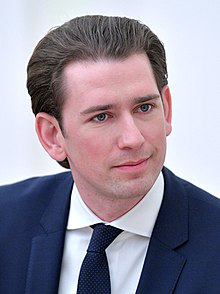

Chancellor of Austria
27 August 1986 Meidling, Vienna, Austria
-
Incumbent
"Kurz" redirects here. For other people with this name, see Kurz (surname). Austrian politician and chancellor of Austria (2017–2019, 2020–) Sebastian KurzKurz in 2018Chancellor of AustriaIncumbentAssumed office 7 January 2020PresidentAlexander Van der BellenVice ChancellorWerner KoglerPreceded by Brigitte BierleinIn office 18 December 2017 – 28 May 2019PresidentAlexander Van der BellenVice ChancellorHeinz-Christian Strache Hartwig LögerPreceded by Christian KernSucceeded by Brigitte BierleinChairman of the Austrian People's PartyIncumbentAssumed office 14 May 2017Secretary-General Karl NehammerPreceded by Reinhold MitterlehnerMinister of Foreign AffairsIn office 16 December 2013 – 18 December 2017ChancellorWerner Faymann Christian KernPreceded by Michael SpindeleggerSucceeded by Karin KneisslChair of the Organization for Security and Co-operation in EuropeIn office 1 January 2017 – 18 December 2017Secretary GeneralLamberto Zannier Thomas GremingerPreceded by Frank-Walter SteinmeierSucceeded by Karin Kneissl Further offices held Member of the National CouncilIn office 9 November 2017 – 22 January 2018Nominated by HimselfAffiliationPeople's PartyIn office 29 October 2013 – 16 December 2013Nominated by Michael SpindeleggerAffiliationPeople's PartyPresident of the Political Academy of the People's PartyIn office 1 September 2015 – 12 March 2018DirectorDietmar HalperPreceded by Werner FasslabendSucceeded by Bettina RauschState Secretary of the Interior for IntegrationIn office 21 April 2011 – 16 December 2013ChancellorWerner FaymannMinisterJohanna Mikl-LeitnerMember of the State and Municipality Diet of ViennaIn office 2010–2011Nominated by Christine MarekAffiliationAustrian People's PartyChairman of the Young People's PartyIn office 2009–2017Preceded by Silvia GrünbergerSucceeded by Stefan Schnöll Personal detailsBorn (1986-08-27 ) 27 August 1986 (age 34) Meidling, Vienna, AustriaPolitical partyAustrian People's Party (2009–present)Domestic partnerSusanne ThierParents Elisabeth Kurz Josef Kurz ResidenceMeidling, ViennaEducationGRG 12 Erlgasse (Matura)SignatureWebsite Official website Chancellery website Parliament website Party website Military serviceAllegiance AustriaBranch/service BundesheerYears of serviceOctober 2004 – June 2005Stationed atMaria-Theresien-Kaserne Sebastian Kurz (German: ; born 27 August 1986) is an Austrian politician who serves as Chancellor of Austria since January 2020, a position he previously held from December 2017 to May 2019. Kurz has also been chairman of the Austrian People's Party since May 2017. Aged 34, Kurz is the youngest head of government in the world, and first elected to the post aged 31, the youngest chancellor in Austrian history. Kurz was born and raised in Meidling, Vienna. In 2004, he graduated from the GRG 12 Erlgasse and completed mandatory military service a year later. Kurz attended the faculty of law at the University of Vienna but later dropped out to focus on his political career. He entered politics by joining the Young People's Party (JVP) in 2003. Five years later he assumed his first political post as chairman of the JVP in Vienna. In 2010, Kurz successfully ran for the Viennese State Diet. As a result of a cabinet reshuffle in 2011, Kurz was nominated and appointed state secretary of the Interior Ministry for social integration. After the 2013 legislative election, Kurz became foreign minister of Austria and remained the country's top diplomat until December 2017. Following the resignation of Vice Chancellor Reinhold Mitterlehner as chairman of the People's Party (ÖVP) in May 2017, Kurz was named his successor. Mitterlehner's withdrawal from politics led to the end of the Kern cabinet and triggered a legislative snap election in 2017; in which Kurz participated as the top candidate of his party. As leader of the largest party after the election, Kurz was charged with forming his first cabinet and subsequently entered a coalition with the Freedom Party (FPÖ). During his term, Kurz passed various changes and overhauls but suffered multiple scandals. Following the Ibiza affair and the end of the ÖVP–FPÖ majority coalition, Kurz was dismissed by the National Council through a motion of no confidence. During his first chancellorship, Kurz youth and political tenor have been credited with revitalizing the traditional conservative movement in Austria, and to a larger extent in Europe. However, opponents have denounced him as uncooperative and hasty, particularly with respect to his signature issues. After the 2019 legislative snap elections, he returned to power, forming another coalition; this time with the environmentalist Green Party. Kurz and his new cabinet were inaugurated in January 2020. However, the coalition's program was quickly impeded by the COVID-19 pandemic. Kurz' coronavirus response and individual restrictions were deemed as indistinct and received with broad criticism. An investigation into the Ibiza affair by a parliamentary subcommittee, an ongoing corruption inquiry, and several other scandals have resulted in a sharp decline of his popularity and job approval.

We use cookies
We use cookies and other tracking technologies to improve your browsing experience on our website, to show you personalized content and targeted ads, to analyze our website traffic, and to understand where our visitors are coming from. Privacy Policy.